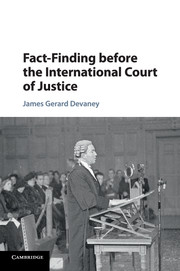Book contents
- Frontmatter
- Contents
- Table of cases
- Acknowledgements
- Introduction
- 1 Rules of evidence before the International Court of Justice
- 2 Criticisms of the Court's current reactive approach to fact-finding
- 3 The practice of other international courts and tribunals
- 4 Winds of change: the possibility of reform
- 5 A more proactive approach to fact-finding
- Epilogue
- Bibliography
- Index
Introduction
Published online by Cambridge University Press: 05 September 2016
- Frontmatter
- Contents
- Table of cases
- Acknowledgements
- Introduction
- 1 Rules of evidence before the International Court of Justice
- 2 Criticisms of the Court's current reactive approach to fact-finding
- 3 The practice of other international courts and tribunals
- 4 Winds of change: the possibility of reform
- 5 A more proactive approach to fact-finding
- Epilogue
- Bibliography
- Index
Summary
In 1958 Neill Alford Jr stated that the likelihood of a dispute as to the facts in any case before the International Court of Justice was fairly remote. He argued that this was so due to the fact that generally neither State party to a case before the Court had sufficient evidence to question the factual assertions made by the other party. However, a number of developments in the intervening fifty or so years have proved Alford wrong, as increasingly the Court has had to deal with cases in which the outcome of the case has turned not just on legal questions but also on factual determinations. As Mosk has stated:
[T]here have been dramatic changes in the availability, ascertainment and importance of facts. The technological age has produced more facts and more facts that can and must be ascertained … it is no longer necessary to wade through a warehouse full of documents to find critical evidence … It also may not be necessary to travel thousands of miles to find documents and interview witnesses. New methods of storing documents and of communicating have drastically affected means of investigating and ascertaining facts.
Crucially, such cases requiring a heavy focus on the facts have challenged the Court's traditional approach to the facts. In the past the Court was often able to decide the outcome of a case through reliance on undisputed facts. In essence, in such cases it was not so much the facts that were disputed, but rather the legal conclusions that were to be drawn from them. It has been remarked that ‘[i]n times past, courts and arbitrators dealt with situations that were not as complex as those today’. Whether or not this is so (for cases such as Corfu Channel and Nicaragua could hardly be described as straightforward in terms of the facts), what is certain is that the Court is increasingly deprived of the possibility of basing its decisions on undisputed facts.
In addition to the disputes coming before the Court being consistently complicated, these complex facts are being increasingly contested. States themselves have demonstrated a willingness to use ‘ever more sophisticated forms of evidence to substantiate their claims’.
- Type
- Chapter
- Information
- Publisher: Cambridge University PressPrint publication year: 2016



